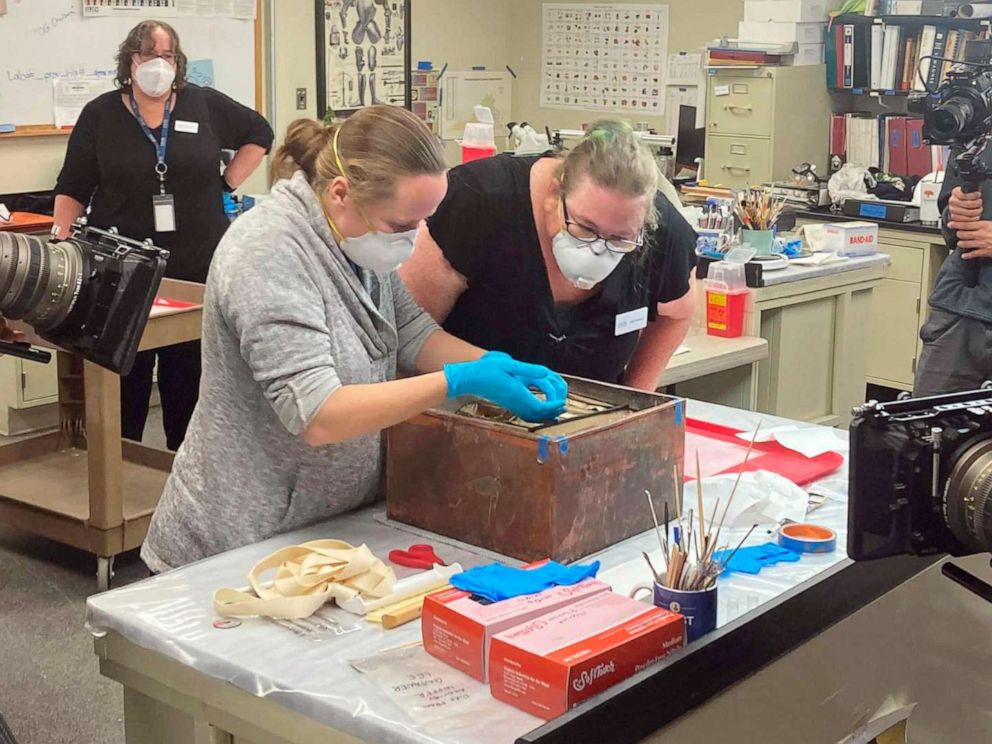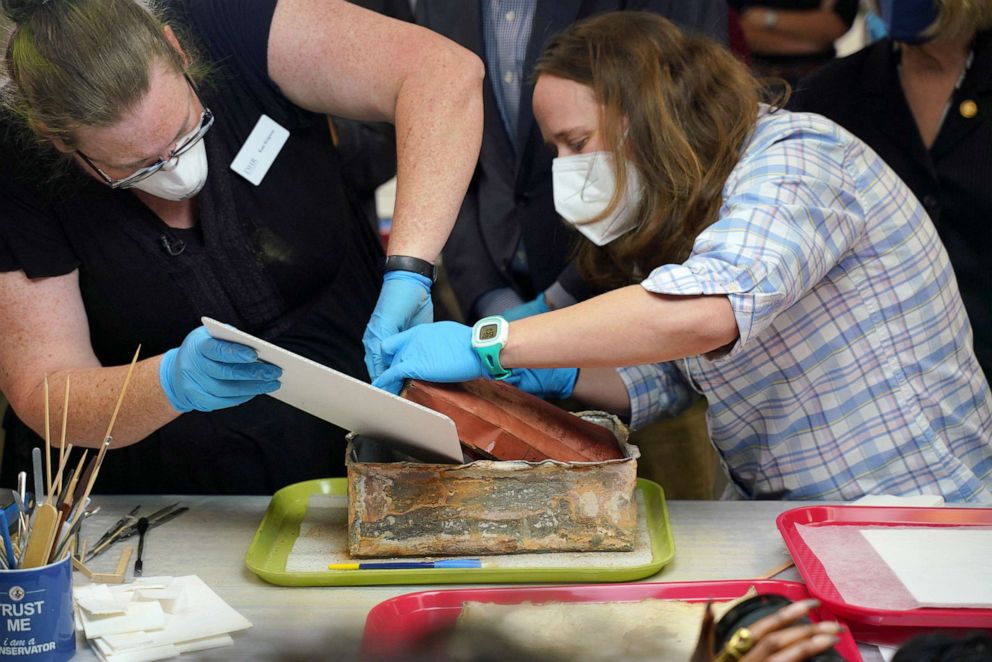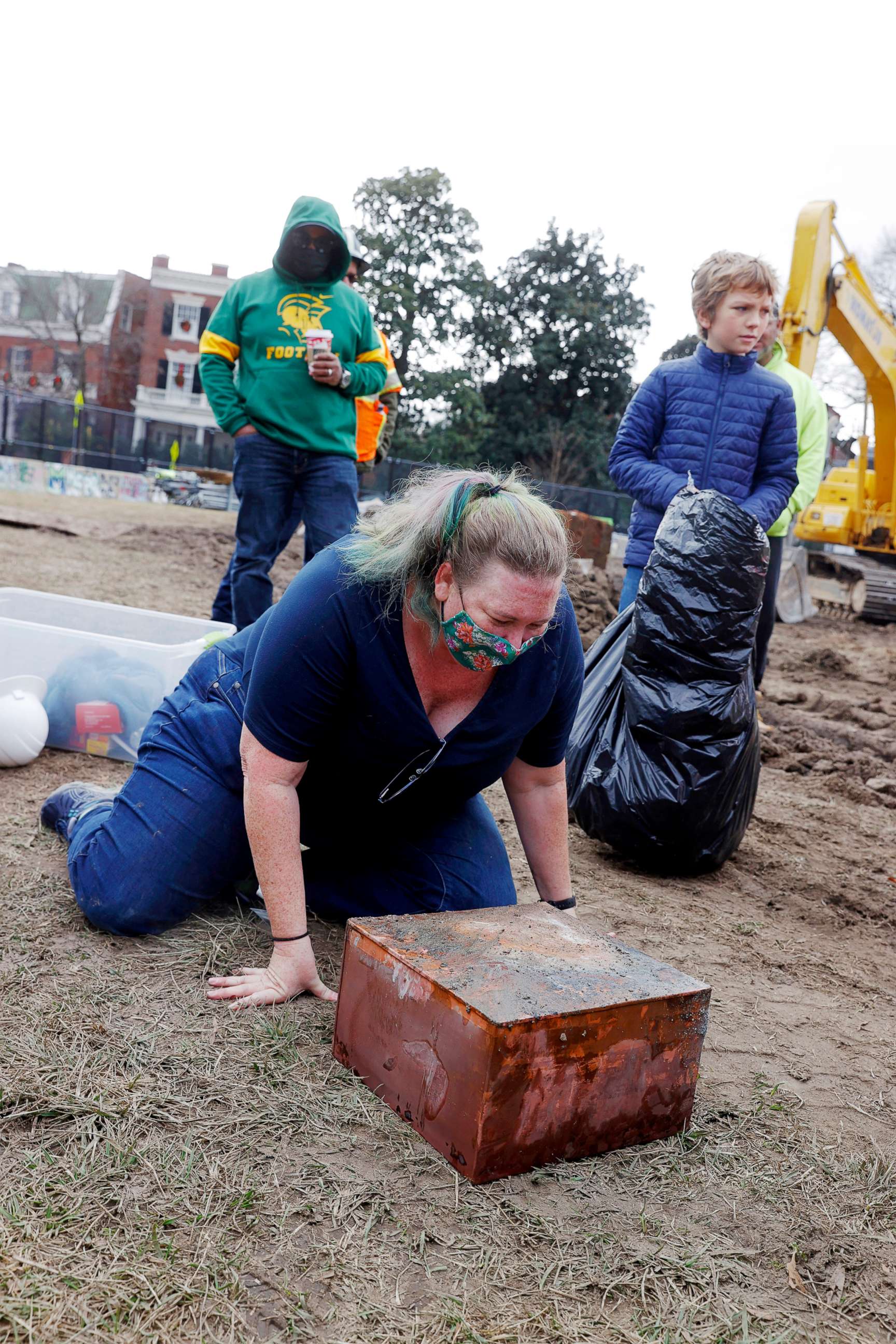What the famed 1887 Virginia time capsule hidden in a Robert E. Lee statue reveals
The items were carefully removed by historians during a livestream event.
Historians on Tuesday cut into a 36-pound copper time capsule containing items over 130 years old, and found in the pedestal of a monument to former Confederate General Robert E. Lee in Richmond, Virginia.
Katherine Ridgway, the state archaeological conservator at the Virginia Department of Historic Resources, cut into the metal and began delicately pulling items from the box as the event was livestreamed on Gov. Ralph Northam's social media pages.

"I think it's in better shape than we expected," said Ridgeway, who noted that many of the items were wet but that the copper may have helped prevent further damage.
The box contained relics including what appeared to be Confederate money, 12 copper coins, an edition of Harper's Weekly from 1865, military memorabilia, multiple books including directories and a Holy Bible, a carved wood flag and Masonic symbol that some believe was allegedly carved from the tree that grew above Gen. Stonewall Jackson's original grave.
Before the box was opened, it was X-rayed by a local bomb squad. During the big reveal, Ridgway pulled out what she believed to be a fragment of a shell from the battle of Fredericksburg.

An issue of the Richmond Dispatch from October 1887 gave historians some clues about what to expect in the box, including a hint about a photo of former President Abraham Lincoln in his casket.
The Lincoln photo was found in the time capsule, but the artifact appeared to be printed and already mended multiple times, which would make it far less valuable than some had hoped.
"From what I can tell, that was a mass printed engraving that appeared in Harper's Weekly," Sue Donovan, a conservator for special collections at University of Virginia Library told reporters. "So it was not an original, it was perhaps a taken from a photograph, but it is an engraving in a newspaper. So the newspaper was from 1865, from what we can tell, unless it was a reprint, which has happened."
The photo of Lincoln, along with all the other artifacts found, will be processed and stabilized for safekeeping. Historians will then analyze their significance and give context to the objects.
Local historian and author Dale Brumfield told ABC News that he was "a little disappointed" that it was not an original, negative photo of Lincoln, which he said would have been "one-of-a-kind."
"[It was] not totally unexpected. I knew there was about a 99% chance that was what it was going to be," Brumfield said. "But you know, you always hold out for that one little surprise, but it just wasn't to be. But still, it was thrilling to see that come out."
That item and many others, which were in good condition, give context to life in Richmond at that time. But Brumfield noted that there were important parts of life in Virginia that were not present in the time capsule.
"The more I watched these things being taken out of this capsule and seeing what was in the capsule just reminded me of what was not in the capsule," Brumfield said. "And what was not in it was anything relating to the Black community of Richmond. Richmond had a thriving Black middle class at the time ... and there was nothing pertaining to that."
Brumfield said that despite the fact that the items inside the capsule do not show a complete picture of life in Richmond at that time, they do show the prominence of the Confederacy in Southern culture, even two decades after the Civil War ended.
"I'm hoping that these items can be preserved in as best a state as they can ... and that they are put on display so that people can come in and see this snapshot of 1887 in Richmond and just seeing how deeply the ideology of the Confederacy in the lost cause was still roaming 22 years after the end of the war," Brumfield said. "I think with the proper signage and context, people can learn a lot about that way of thinking and what life was like then and how this lost caused mythology just stubbornly clinged to Richmond and the South for so many years."
Just last week, historians were let down by another time capsule found in the pedestal of the Robert E. Lee. Inside the small led box, they hoped to find precious historical items, but instead, they found what appeared to be an almanac from 1875, a copy of "The Huguenot Lovers: A Tale of the Old Dominion," a photograph and a coin.
Quickly, local historians like Brumfield, began to believe it wasn't the time capsule they had learned about.
"I knew right from the beginning that something was amiss," Brumfield told ABC News in an interview after the first time capsule was opened. "And the more I thought about it, the more I studied my notes, and some of the historical records. I said, 'This ... this is a different time capsule.'"
Brumfield thinks that the books and photos relate to two men who were involved in the construction of the pedestal who wanted their own time capsule. His theory is: "It's just an ego trip for the builders of this monument."

"I believe that those guys were left out of the original time capsule, and they decided that they wanted to commemorate themselves by putting this small lead box up 20 feet up, which is the halfway point in the construction," Brumfield said.
Brumfield suspected the other time capsule was still in the pedestal. Just a few days later, Northam announced that construction crews had, in fact, discovered it.
"They found it!," Northam said in a tweet Monday. "This is likely the time capsule everyone was looking for."
The pedestal containing both capsules stood beneath a bronze statue of Confederate general Robert E. Lee on horseback that was removed in September 2021, following nationwide racial justice protests after George Floyd was killed by police in Minneapolis.
Virginia is now making plans to create a new time capsule to reflect the present day.
"This monument and its time capsule reflected Virginia in 1890 -- and it's time to remove both, so that our public spaces better reflect who we are as a people in 2021," Northam said in a September press release. "The past 18 months have seen historic change, from the pandemic to protests for racial justice that led to the removal of these monuments to a lost cause. It is fitting that we replace the old time capsule with a new one that tells that story."




